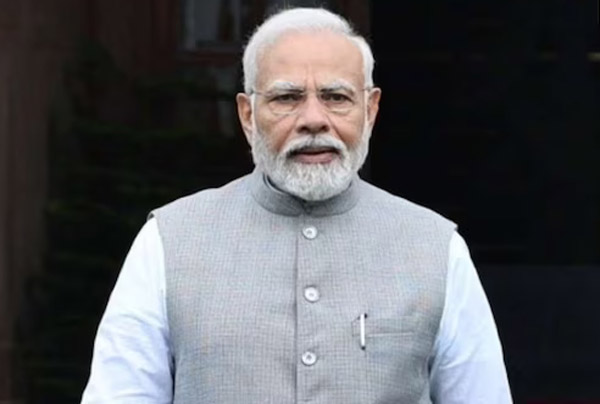NEW DELHI, Sep 23: Prime Minister Narendra Modi today said his government is making sincere attempts to draft laws in a simple manner and in Indian languages to the maximum extent, asserting that the language in which laws are written and court proceedings conducted play a key role in ensuring justice.
“The common man should consider the law as his own,” he said.
Inaugurating the International Lawyers’ Conference here, Modi also said that with India working hard to achieve the goal of becoming a developed country by 2047, it requires the base of a strong and impartial justice system. Impartial justice has a big role in the growing faith of the world in India, he added.
The prime minister also flagged concerns about cyber terrorism and money laundering besides the use of artificial intelligence for destructive purposes. He said these dangers do not recognise borders and jurisdiction and called for collaborative efforts among legal frameworks of different countries to deal with them.
He cited the example of cooperation between air traffic control systems of all countries to ensure air travel and said preparing a global framework to deal with these dangers is not about one government or country.
“Every legal mind or institution is highly vigilant about its jurisdiction. However, there are many forces against which we are fighting that do not care about borders or jurisdictions. When danger is global, then the manner to deal with it should also be global.”
Whether it is cyber terrorism, money laundering, artificial intelligence, or its misuse, there are many issues where cooperation requires a global framework. It is not merely a matter for any one government or administration, Modi observed.
Commenting on the legal system, Modi said the language used to write laws and in the judicial process play a big role in ensuring justice.
“We in the Indian government are thinking that law should be produced in two ways. One draft will be in the language you are used to,” he told the audience drawn from the legal fraternity. “The second draft will be in a language which the country’s common man can understand. He should consider the law as his own.”
Modi said there had been a practice of drafting laws in a complex manner.
One of the aspects of justice delivery on which there is very little discussion is the language and the simplicity of law, the prime minister noted.
He said the government is trying to make laws simple and understandable to the common man but the system has been ingrained in the same framework and he was trying to pull it out of that.
Modi said he has a lot to do and a lot of time for it. “So I will keep doing it.”
“We have made the first beginning in the Data Protection law,” the prime minister said, referring to attempts to draft laws in simple language. He also welcomed the Supreme Court’s decision to provide the operative part of a judgment to the litigant in his language.
“Look, it took 75 years even for this small step, and I had to intervene in it too,” he said.
He lauded the apex court for translating its judgments into many local languages.
“This will greatly help the common people of the country. Half the illness gets cured if a doctor talks to his patient in his language. Here, we have similar progress to make.”
Dubbing the Indian Penal Code(IPC) and the Evidence Act as colonial-era laws, the government had recently introduced the Bharatiya Nyaya Sanhita, Bharatiya Nagarik Suraksha Sanhita and the Bharatiya Sakshya Bill to replace the IPC, Code of Criminal Procedure(CrPC) and the Indian Evidence Act respectively.
Chief Justice of India D Y Chandrachud, Union Law Minister Arjun Ram Meghwal, Lord Chancellor and Secretary of State for Justice of the United Kingdom Alex Chalk KC, Attorney General for India R Venkataramani, Solicitor General Tushar Mehta, Bar Council of India chairman and senior advocate Manan Kumar Mishra and others, including several judges of the apex court, were present at the event.
Modi also pushed for improving legal procedures through technology, reforms, and new judicial practices.
Technological advancements have created significant avenues for the judiciary system. In fact, technological advancements have given a tremendous boost to our trade, investment, and commerce sectors. Therefore, individuals associated with the legal profession should also embrace these technological reforms, he said.
Lauding the legal fraternity, the prime minister said the judiciary and the Bar have long been protectors of India’s justice system and noted that they played a pivotal role in India’s Independence. The likes of Mahatma Gandhi, B R Ambedkar, Jawaharlal Nehru and Sardar Vallabhbhai Patel were lawyers, the prime minister said.
The conference, he said, is happening at a time when India has witnessed several historic moments.
Referring to the passage of the women’s reservation bill in Parliament, he said this will give new direction and energy to women-led development. He also spoke of the G20 Summit and the successful Chandrayaan-3 mission.
Speaking on alternate dispute resolution, the prime minister said with the increasing complexity of commercial transactions, the ADR mechanism has gained currency all over the world.
To systematise the informal tradition of dispute resolution in India, the government has enacted a law on mediation. Similarly, Lok Adalats are also playing a big role and they have settled nearly seven lakh cases in the last six years. (PTI)
Trending Now
E-Paper


